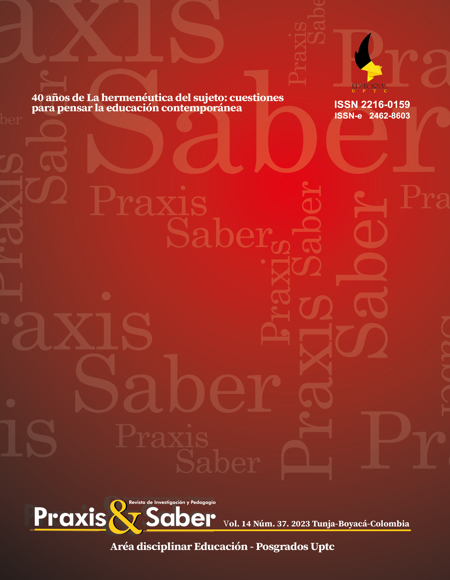Shame-less education a reading of Alcibiades I (119a-135e)

Abstract
The present article aims to think of shame as a condition of the possibility of education. For this purpose, it is based on sections 119a-135e of Plato's Alcibiades I Dialogue. Thus, shame is oriented in two directions: the first in its broad and affirmative sense, the second in a specific and negative sense. In any case, we do not intend to sustain the idea that shame or shame-lessness by itself is the natural and efficient cause of education, since this would imply an annulment of the work of the educator and the student. On the contrary, we seek to rescue the work of the educator in the face of the situation presented to him. We will proceed, first, to frame the terms education and shame, specifying what the former implies in the context of the referred dialogue. Secondly, we will present three ways in which shame can be confronted in order to promote education: the use of the λόγος (thinking), the act of looking, and the acceptance of God. Finally, we will show the conclusions obtained through this approach that ought to be problematic.
Keywords
shame, education, λόγος (thought), look, divinity
References
- Arpini, A. (2018). La experiencia filosófica como expectativa y heroísmo en Humberto Giannini y Arturo Roig: para un humanismo crítico latinoamericano. Utopía y Praxis Latinoamericana, 23(81), 46-56. https://doi.org/10.5281/zenodo.2253290
- Boeri, M. (2021). La ignorancia socrática como virtud epistémica. Pensamiento. Revista de investigación e información filosófica, 77(293), 103-122. https://doi.org/10.14422/pen.v77.i293.y2021.006 DOI: https://doi.org/10.14422/pen.v77.i293.y2021.006
- Bustamante, G. (2023). Actualidad de la filosofía de la educación. Colección Filosofía y Enseñanza de la Filosofía. Universidad Pedagógica Nacional.
- De Marzio, D. (2007). The Care of the Self: Alcibiades I, Socratic Teaching and Ethic Education. The Journal of Education. 187.3. Trustees of Boston University. DOI: https://doi.org/10.1177/002205740718700308
- Del Mastro, F. (2020). El ethos socrático y la formación del ser en la enseñanza del derecho. Revista pedagogía universitaria y didáctica del derecho, 7(1), 195–224. https://doi.org/10.5354/0719-5885.2020.57701 DOI: https://doi.org/10.5354/0719-5885.2020.57701
- Durán, M. (1991). Alcibíades según Platón. Habis 22.
- Finkelberg, M. (Ed.). (2011). Homer Encyclopedia. Vol I. Wiley-Blackwell. DOI: https://doi.org/10.1002/9781444350302
- Flores-Acosta, M., & Cruz-Martínez, M. (2020). Consideraciones sobre el deseo y la transferencia en la educación. Tesis Psicológica, 15(2), 1-16. https://doi.org/10.37511/tesis.v15n2a7 DOI: https://doi.org/10.37511/tesis.v15n2a7
- Garcés, M. (2020). Escuela de aprendices. Editorial Galaxia Gutenberg.
- Hadot, P. (2006). Ejercicios espirituales y filosofía antigua (J. Palacio, Trad.). Ediciones Siruela.
- Homero. (1991). Ilíada. (E. Crespo, Trad.). Gredos.
- Leigh, F. (2020). Self-Knowledge, Elenchus and Authority in Early Plato. Phronesis, 65. (pp. 247-280). http://dx.doi.org/10.1163/15685284-BJA10020 DOI: https://doi.org/10.1163/15685284-BJA10020
- Logeion. (s/f). Logeion. Uchicago.edu. Recuperado el 17 de junio de 2023, de https://logeion.uchicago.edu/%CE%BB%CF%8C%CE%B3%CE%BF%CF%82
- Luri, G. (1998). El proceso de Sócrates. Editorial Trotta.
- Luri, G. (2004). Guía para no entender a Sócrates. Reconstrucción de la atopía socrática. Editorial Trotta.
- Magnone, M. (2022). El ojo como espejo de sí mismo en la India y en Grecia. Revista de Filosofía. (160), 119-132 DOI: https://doi.org/10.15517/revfil.2022.51458
- Mársico, C. (2021). Diálogos interepocales en el Alcibíades I platónico. Aspectos fenomenológicos a propósito de la intersubjetividad y la empatía en el símil de la mirada. Eidos. Revista de Filosofía de la Universidad del Norte, (35), 15-39. https://doi.org/10.14482/eidos.35.184 DOI: https://doi.org/10.14482/eidos.35.184
- Palumbo, L. (2020). Socrate o dello specchio. Strategie di scrittura nell’Apologia e nell’Alcibiade. Plato Journal 20, 81-95. https://doi.org/10.14195/2183-4105_20_6 DOI: https://doi.org/10.14195/2183-4105_20_6
- Pereira da Silva, J. (2020). Socrates on being good. Unisinos Journal of Philosophy 21(2) (pp. 127-134). https://doi.org/10.4013/fsu.2020.212.01 DOI: https://doi.org/10.4013/fsu.2020.212.01
- Platón. (1981). Diálogos I. Apología, Critón, Eutifrón, Ion, Lisis, Cármides, Hipias menor, Hipias mayor, Laques, Protágoras. (J. Calonge, E. Lledó, C. García, Trads.). Gredos.
- _____. (1983). Diálogos. II. Gorgias, Menexeno, Eutidemo, Menón, Cratilo. (J. Zaragoza, P. Gómez, Trads.). Gredos.
- _____. (1992). Diálogos. VII. Dudosos, apócrifos y cartas. (J. Zaragoza, P. Gómez, Trads.). Gredos.
- Prieto-Parra, M. (2010). La práctica pedagógica en el aula: un análisis crítico. Revista Educación y pedagogía, 1(4), 73–92. Recuperado a partir de https://revistas.udea.edu.co/index.php/revistaeyp/article/view/5624
- Real Academia Española. (s. f). Vergüenza. Diccionario de la lengua española. Recuperado el 30 de junio de 2023 de https://dle.rae.es/verg%C3%BCenza
- Skliar, C. (2022). Entre la fragilidad de la vida y la insistencia del mundo. Educación y Ciencia, 26. https://doi.org/10.19053/0120-7105.eyc.2022.26.e14562 DOI: https://doi.org/10.19053/0120-7105.eyc.2022.26.e14562
- Zubiri, X. (1992). Cinco lecciones de filosofía. Sociedad de estudios y publicaciones.
